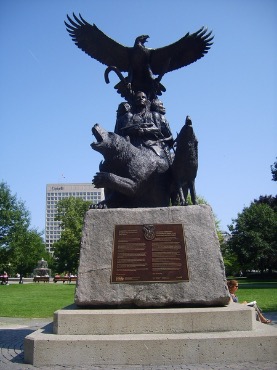
The National Aboriginal Veterans Monument in Confederation Park in Ottawa. Photo courtesy – Veterans Affairs Canada
Aboriginal Canadians have been part of our proud military history for over 200 years.
During the War of 1812, they were vital allies in the protection of Canada, helping protect the citizens of this emerging country from attacks and invasions of Americans. Since then, thousands served bravely in both World Wars and the Korean War. Without their sacrifices, we might not have the Canada we have today.
Some of these veterans are some of the highest decorated soldiers, aviators and sailors in our military history. Sergeant Tommy Prince was a member of 2nd Battalion, Princess Patricia’s Canadian Light Infantry at Kapyong, and was one of the most decorated aboriginal soldiers in Canada. Some veterans have even been tagged as heroes, though many didn’t think they should be considered heroes because to them they were only doing their duty.
Aboriginal Veterans Day was established in Manitoba in 1994 and has since spread across the country to the other provinces and has been renamed National Aboriginal Veterans Day, recognized annually on Nov. 8. It’s a day to recognize and acknowledge the many contributions and sacrifices of Aboriginals not only to Canada’s war efforts but to its peacekeeping reputation.
A national monument was later erected in Ottawa, just down from the National War Memorial. On National Aboriginal Day on June 21, 2001, the National Aboriginal Veterans Monument was unveiled by then‑Governor General Adrienne Clarkson to commemorate the contributions of Aboriginal peoples in war and peacekeeping.
Today, about 3.5 per cent of the Canadian Armed Forces is of First Nation descent, representing many distinct cultures. They continue to make Canada proud through their service at home and abroad. We should honour their contributions and of those before them.
One negative that came after the amazing contributions Native soldiers made to our nation’s war effort through their gallant service, and service in general, was how they were treated by Veterans’ Associations and society as a whole. An Aboriginal veteran was not allowed to share a “toast” in honour of lost comrades with fellow veterans in a Royal Canadian Legion until 1951, and only if the province where the Legion was located allowed it. This included Remembrance Day. It wasn’t until the mid‑1990s that Native veterans and families were authorized to lay wreathes or have their own formed guards at the National War Memorial in Ottawa on Remembrance Day.
In this day and age of reconciliation, acknowledging Aboriginal roles in the protection of Canada will help other citizens understand what true reconciliation means to the country as a whole. We must never forget the sacrifices and accomplishments of Aboriginal Veterans, especially as we move forward in our journey of healing, reconciliation and a renewed relationship between Canada and its First Nations peoples.
Nov. 8 is about making efforts to better understand the role Indigenous Veterans have played in Canada, and expressing our heartfelt gratitude. Ceremonies are held across Canada to mark this day, and Canadians across the country should pause for a minute or two to honour our Aboriginal veterans.
MWO Sheldon Quinn, 3rd Canadian Division Indigenous Advisor
- Men’s Curling Standings as of March 2nd - March 4, 2026
- Split the Pot Lottery “Marches Into Gold” - March 2, 2026
- New leaders take helm of United Steelworkers union - March 2, 2026
 Wawa-news.com Local and Regional News
Wawa-news.com Local and Regional News